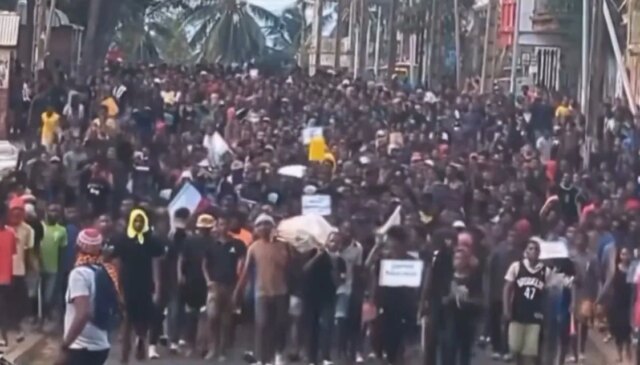New Delhi, Oct 15: Madagascar’s fragile democracy has once again been toppled. After weeks of street protests led by the country’s frustrated young generation, an elite military unit announced it had seized power from President Andry Rajoelina, marking the latest in a string of youth-fuelled movements reshaping politics across the developing world.
Standing before cheering crowds outside the presidential palace, Col Michael Randrianirina, chief of the Personnel Administration and Technical and Administrative Services Corps (CAPSAT), declared that the army had taken control and would establish a transitional government, reports international media. Elections, he said, would be held within two years. Key democratic bodies, including the electoral commission, were suspended.
“Gen Z protesters will be part of the changes,” Randrianirina told the BBC. “The movement was created in the streets, so we must respect their demands.” In the capital, Antananarivo, jubilant crowds filled Independence Avenue, waving Malagasy flags and chanting slogans calling for “a new beginning.” Soldiers and demonstrators embraced each other, a rare sight in a country that has endured years of economic stagnation, erratic governance, and growing youth disillusionment, BBC reported. The coup marks a dramatic reversal for CAPSAT, the same unit that had once backed Rajoelina when he rose to power in a 2009 military-supported transition. But this time, it sided with the protesters, joining their demonstrations over the weekend.
The constitutional court endorsed Randrianirina as Madagascar’s new leader, while Rajoelina’s office decried the move as “an attempted coup d’état.” BBC reported that the president’s whereabouts remain uncertain; officials say he fled to a “safe location” after an alleged attempt on his life. Unconfirmed reports suggest he may have left the country aboard a French military aircraft.
The unrest was sparked by anger over power cuts and water shortages, but it quickly evolved into a broader anti-government movement. Youths, many unemployed or underemployed, demanded accountability for corruption and economic hardship in a nation where three-quarters of the 30 million citizens live below the poverty line. Clashes with security forces left at least 22 people dead and more than 100 injured, according to UN figures.
Rajoelina, once hailed as Africa’s youngest leader when he took power at 34, had promised reform and modernisation. But mounting allegations and mismanagement, coupled with a worsening cost-of-living crisis, eroded his support even within his own party. On Tuesday, the national assembly voted 130–1 to impeach him, with ruling party lawmakers joining the opposition.
The rise of Madagascar’s youth-led movement fits into a wider global pattern. Over the past few years, Gen Z protests have emerged as a defining political force, often organised through digital platforms and leaderless networks. The movement’s origins can be traced back to Hong Kong’s 2019 pro-democracy protests and the Fridays for Future climate strikes launched by Swedish teenager Greta Thunberg, which introduced a new, globally networked activism. From Nigeria’s #EndSARS campaign against police brutality and Thailand’s student-led challenges to royal power, to Myanmar’s anti-coup resistance, young people have repeatedly taken the lead in confronting political and institutional power. The protests are distinguished by their social-media-driven organisation and a refusal to align with traditional parties, traits that were mirrored in Madagascar’s streets.
In recent years, a wave of such youth uprisings has also swept through South Asia and Africa, toppling long-entrenched leaders and shaking political orders. In Bangladesh, student protests against job quotas escalated into a nationwide revolt that forced Prime Minister Sheikh Hasina’s resign and leave the country in 2024. In Nepal, demonstrations over a government social media ban spiralled into an anti-corruption crusade that led to the fall of the government in 2025. Sri Lanka’s “Aragalaya” movement of 2022–23 brought down President Gotabaya Rajapaksa, while Kenya’s Gen Z-led rallies over inflation and corruption pushed authorities to retract unpopular tax measures. From Morocco’s “Gen Z 212” protests to student movements in Timor-Leste and Peru, the same generational anger at inequality and misrule has surfaced. Madagascar’s upheaval, now spearheaded by its digitally connected youth, thus joins this expanding roster of Gen Z revolts reshaping the political landscape.
Madagascar, the world’s fourth-largest island, lies off Africa’s southeastern coast across the Mozambique Channel and is a member of the African Union and the Indian Ocean Rim Association. Its 30 million people country also hosts a small but influential Indian diaspora, largely Gujarati traders, whose presence dates back more than a century, reflecting Madagascar’s long-standing cultural and commercial connections with India.








